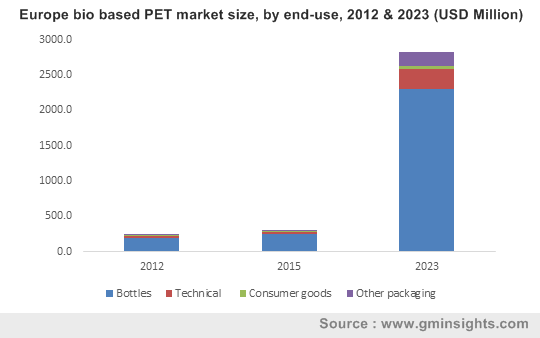Home > Chemicals & Materials > Polymers > Industrial Polymers > Bio Based Polyethylene Terephthalate (PET) Market
Bio Based Polyethylene Terephthalate (PET) Market Size
- Report ID: GMI446
- Published Date: May 2016
- Report Format: PDF
Bio Based Polyethylene Terephthalate Market Size
Bio Based Polyethylene Terephthalate (PET) Market size was over USD 1.5 billion in 2015 and expects over 40% growth rate.

Increasing awareness among consumers for biomass derived products and stringent government norms by EU to encourage environmental friendly products should drive global bio based PET market size. Global sustainable packaging market size was over USD 150 billion in 2015 and is forecast to surpass USD 250 billion by 2023, with around 4.5% gains.
Australia commenced programs including Australian Packaging Covenant (APC) and Packaging Product Stewardship Scheme (PPSS) to promote sustainable packaging. International companies like Coca-Cola, Nike, Procter & Gambler, H.J. Heinz, Ford motor and Hindustan Unilever have contracted a Plant PET Technology Collaborative (PTC), to speed up the use and development of 100% bio based PET usage in apparels, floor carpets, plastic bottles, footwear and technical seat firms.
| Report Attribute | Details |
|---|---|
| Base Year: | 2015 |
| Forecast Period: | 2016 to 2023 |
| Historical Data for: | 2012 to 2015 |
| No. of Pages: | 64 |
| Tables, Charts & Figures: | 57 |
| Segments covered: | Application and Region |
Global biomass obtained chemicals market size was above 4.5 million tons in 2015 and would exceed 8.5 million tons by 2023, growing at over 9.5%. Increasing health awareness among consumers encourages biomass obtained chemicals usage which may positively influence bio based PET market size.
Bio based PET is a sugar obtained ethanol product which have 25%-30% bio MEG. Change in emphasis to reduce GHG emission due to rising pollution and health effects can boost bio based polyethylene terephthalate market size.
Countries including Australia, Canada and Japan adopted Kyoto protocol and the U.S. and Canada approved Montreal protocol, which can restrict synthetic polyethylene terephthalate usage responsible for GHG emission. These regulatory norms could help develop bio based PET market size over the foreseeable period.
Sugarcane is a major raw material bio ethanol production and is also used in MEG manufacturing. Increasing sugar demand for direct human ingestion may obstructs availability of sugarcane as raw material for bio ethanol production.
Constructive regulations formed by Brazilian and the U.S. governments for sustainable fuel practice obtained from biomass in vehicles should boost bio ethanol demand. These reasons may limit availability of raw material for MEG manufacturing which can affect bio based PET price trend.
Decrease in crude oil price should influence bio PET industry profit as it may turn out to be more expensive than synthetic products. But still, bio based PET industry market forecasts price swing to achieve uniformity with its synthetic counterparts over the estimated period.
Polyethylene furanoate (PEF), serves as an alternative to bio PET for its stretchable strength and light weight properties, which may affect industry growth. It requires more staple quantity to manufacture bio PET than bio PEF which hampers the use of PET in bottles for packaging of food & beverages products.
